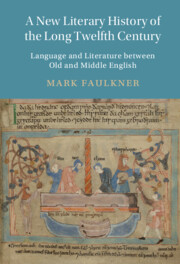 A New Literary History of the Long Twelfth Century
A New Literary History of the Long Twelfth Century Book contents
- A New Literary History of the Long Twelfth Century
- Cambridge Studies in Medieval Literature
- A New Literary History of the Long Twelfth Century
- Copyright page
- Dedication
- Contents
- Figures
- Acknowledgements
- Conventions Used
- Abbreviations
- Part I Preliminaries
- Part II The Affordances of English
- Chapter 3 English in the Linguistic Ecology of the Long Twelfth Century
- Chapter 4 English as a Language of Documentary Record
- Chapter 5 English as a Language for Writing History
- Chapter 6 English as a Language for Sermon Writing
- Chapter 7 Conclusion
- Bibliography
- Index
- Cambridge Studies in Medieval Literature
Chapter 7 - Conclusion
from Part II - The Affordances of English
Published online by Cambridge University Press: 14 July 2022
- A New Literary History of the Long Twelfth Century
- Cambridge Studies in Medieval Literature
- A New Literary History of the Long Twelfth Century
- Copyright page
- Dedication
- Contents
- Figures
- Acknowledgements
- Conventions Used
- Abbreviations
- Part I Preliminaries
- Part II The Affordances of English
- Chapter 3 English in the Linguistic Ecology of the Long Twelfth Century
- Chapter 4 English as a Language of Documentary Record
- Chapter 5 English as a Language for Writing History
- Chapter 6 English as a Language for Sermon Writing
- Chapter 7 Conclusion
- Bibliography
- Index
- Cambridge Studies in Medieval Literature
Summary
This chapter emphasises the principal finding of the book, that the practices for writing English developed before 1066 survived the Norman Conquest. It offers a reading of the short poem, ‘Sanctus Beda was iboren her’, taking it as typical of the texts considered in the book, with no agreed title, an uncertain date of composition and viewed here as “Old” English, there as “Middle” English. It argues the poem, often read as an indictment of post-Conquest cultural rupture, in fact speaks powerfully to the continuities between twelfth-century texts and earlier works. The chapter closes by considering other genres the book has not mentioned but for which English was occasionally used in the long twelfth century, including non-homiletic religious texts, prognostics, glosses, medical works and memoranda.
Keywords
- Type
- Chapter
- Information
- A New Literary History of the Long Twelfth CenturyLanguage and Literature between Old and Middle English, pp. 225 - 234Publisher: Cambridge University PressPrint publication year: 2022
